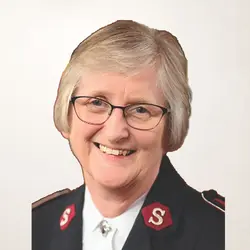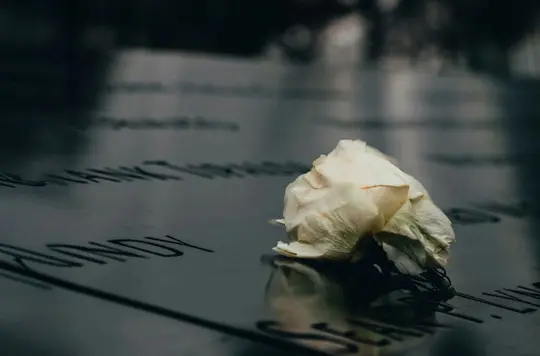2 August 2025
Matthew 5: Blessed are the peacemakers
Lieut-Colonel Karen Shakespeare
Lieut-Colonel Karen Shakespeare calls us to actively work to restore harmony.
Key texts
In Peace at Last by Jill Murphy, noises in the house and garden frustrate Mr Bear’s efforts to sleep, each evoking the ever more despairing cry: ‘Oh no, I can’t stand this.’ Early in the morning, he discovers that Mrs Bear has stopped snoring and so he finally falls asleep in bed – just before the alarm clock rings. For Mr Bear, peace is quietness.
Pause and reflect
- How do you describe peace?
Throughout the Bible, God is a God of shalom – a peace that is not characterised by the absence of noise or conflict but by the positive qualities of wholeness, flourishing and delight. The prophet Isaiah associates these characteristics with the future reign of God (see Isaiah 11:6–9). Until that time God’s people must ‘seek peace and pursue it’ (Psalm 34:14).
By the time of the New Testament, the people of God were still looking forward to the time of God’s Kingdom, but they were a subject people, downtrodden and oppressed by the Romans. Some people believed the only way to bring in God’s Kingdom would be to defeat the Romans with violence. In their passion to do the work of God they forgot the nature of God.
Jesus spoke of a Kingdom that is both here and not yet, a world that is still anticipating the fullness of God’s reign. It was in this world that Jesus said: ‘Blessed are the peacemakers, for they will be called the children of God’ (Matthew 5:9).
Peacemakers are needed to address the inevitable tensions that arise in a world that is not yet fully redeemed. They actively work to restore harmony. Their lives and actions – their commitment to reconciliation and shalom – mark them out as belonging to God.
Peacemakers begin from a foundation of personal peace that arises from their experience of reconciliation to God through Christ (see Colossians 1:20). They rely on the Holy Spirit for guidance and inspiration as they navigate sensitive situations. They are aware of people’s needs and hopes, are willing to listen carefully, exercise patience and work for a solution that allows everyone to feel valued.
True peacemakers are not afraid to confront wrong but, rather than responding in any way that will escalate the situation, they aim to ‘overcome evil with good’ (Romans 12:21). Peacemaking is challenging and, at its best, it is bold and transformative. It treats everyone with respect, working to create a just and lasting solution, which is marked by forgiveness, and allows everyone to emerge from the tension with dignity. Above all, peacemaking enables people to live in unity and harmony.
Paul’s letter to the Romans sets a challenge but is also realistic about the outcome: ‘If it is possible, so far as it depends on you, live at peace with everyone’ (Romans 12:18). This verse recognises that in any group of people – including every Christian community – there is potential for conflict. At the same time, it highlights the personal responsibility of every individual to seek to live in peace so far as they are able. When this is not possible, the skills of a peacemaker may be required to find a way through the division. Reconciliation is never a single action; it’s a process that requires continual commitment to shalom.
For some Christians, this is a distinctive calling and a gift, which is worked out in difficult and demanding situations. For most, the commitment to being a peacemaker will be worked out in our relationships with family, friends and the community. It will be woven into the fabric of our being and shape our actions and reactions. When tension or conflict arises, we should try to find a way forward, recognising and setting aside any natural desire to be right or seek advantage, with a commitment to heal divisions and restore broken relationships.
Pause and reflect
- Can you recall a time in your life when you acted as a peacemaker?
- What did you do? How was the situation resolved?
- How does your faith influence the way you handle conflict in relationships?
- Identify an unresolved conflict in your life. Who might help you achieve peace?
We recognise that tension and conflict are not limited to disagreements between individuals or within our communities. Throughout the world we see conflict between communities and nations. There is need for peacemaking on a global scale.
Peace is often threatened when those who do not hold power feel that they are being ignored or treated unjustly, or when one nation feels threatened by the policies and strategies of another. Where conflict escalates, there is need for peacemakers to invest their time and energy into building a solution. Peace cannot be imposed, nor can it be achieved by force or coercion. It requires professional peacemakers – some of whom are Christians – who share a commitment to a long-term process in which the goal is not an uneasy temporary truce but a new, lasting and just relationship based on truth, honesty and mutual respect. They influence the future of nations and our global peace.
Pause and reflect
- Name the situations and places in our nation and the world where there is no peace.
- Who is suffering or being displaced?
- Who is seeking to bring peace?
- Spend time praying for people who are affected by war and conflict.
- Spend time praying for all who work to bring peace in our world.
Jesus said: ‘Blessed are the peacemakers, for they will be called children of God.’ As children of God, our task is to participate in God’s work of bringing shalom. Where in your life are you being called to be a peacemaker?
Bible study by

Lieut-Colonel Karen Shakespeare
Chair of the International Theological Council, IHQ
Discover more

Captain Alison Hutchings reminds us that mercy is a sign of a transformed heart.

Major Malcolm Martin wonders if the deepest joy stems from coming through the most difficult times.

Captain Clare Kinsey reminds us that childlike faith and focus can help us see God.

